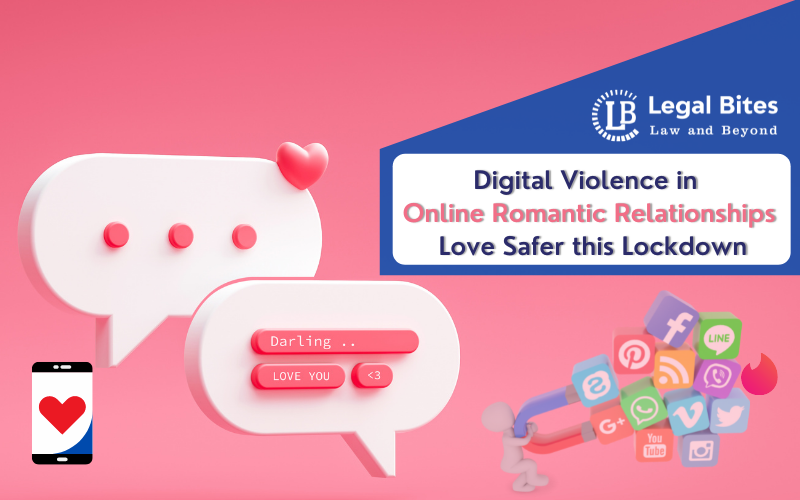Digital Violence in Online Romantic Relationships: Love Safer this Lockdown
As we gear to embrace fresh lockdowns, it would be important to buckle up against other vices that the pandemic begets. For the past two years, being confined to our homes, we have witnessed how our dependence on technology has increased exponentially. From being a means of recreation to being a platform for romantic composure, social media has… Read More »

As we gear to embrace fresh lockdowns, it would be important to buckle up against other vices that the pandemic begets. For the past two years, being confined to our homes, we have witnessed how our dependence on technology has increased exponentially. From being a means of recreation to being a platform for romantic composure, social media has evolved with the pandemic.
Just like our needs and demands, video watchlists, downloaded apps, and surfing preferences also vary with age. On one hand where mobile phones play spiritual partners for elders; adolescents, and adults find their romantic consort in the gadget.
Dating apps like Tinder are not something that developed during the pandemic; however, their usage did increase during the lockdown. More interestingly, what also increased was the dependence of couples on various apps for continued connection. WhatsApp, Snapchat, Facebook Messenger, Instagram, and many other similar apps with video and voice calling services and texting facilities became the favourite repose for couples separated by lockdowns.
Some love stories escalated faster than others, while others collapsed. What remained common was the exposure of both parties to these third-party apps and their personal communication being stored with them.
Digital Violence in Online Romantic Relationships
Just like seasons, human nature changes and with it changes their response to situations. Rejection from a potential suitor could mean leaking their personal photographs or circulating their profiles on objectionable websites. With an aim to demean a partner, heartbroken lovers often resort to blackmailing.
During the pandemic, newer means of such intimidation emerged and expanded. From recording an intimate video call without the participant’s consent to engaging in sexual talks without their liking, online dating has become a platform for multiple forms of abuse. It is not to be assumed that only a particular gender could be vulnerable to such exploitation.
Revenge and retaliation can come in many forms, irrespective of gender and age. One should not forget that consent matters in relationships even if they are digital. Online romantic exchanges are more vulnerable to being used to exploit partners owing to the trail of evidence they leave.
You might very well have indicated to your partner that you would not want your private moments to be recorded, however, with the lack of an option to be notified when screen recording is initiated, your privacy lies at the behest of your partner’s whims. Other forms of violence might include nagging your partner to send intimate pictures, even when they have clarified their displeasure.
Often a fear of losing your partner might lead you to consent to their demands, but such consent is coercively achieved and often leads to deep impacts on one’s mental health and self-esteem. A lack of communication from one partner’s end when their demand to engage in sexual communication is rejected often pressurizes the other party to lean into their dictation. This is an emerging form of intimate partner violence.
Even though restricted to digital space, violence needs to be traced and combatted with the victim being rehabilitated. Perpetrators often initiate a trust-building cycle, where they share their personal details, pictures, and videos. In this phase, they would never force the victim to reciprocate with similar content. However, latently, this induces a sense of obligation in the partner to share the same or similar level of intimacy.
What is intricately inherent in this scenario is the induced obligation. Violence always does not come through an action disregarding the victim’s lack of consent. It can very well be induced by a way of not seeking express consent or not reading into an express lack of reciprocation as a lack of consent.
Intimate relationships are often laced with such indirect forms of violence which are difficult to detect and are often neglected by the victim until it culminates into wider threats such as mishandling private details, not allowing an amicable breakup, inducing insecurities, and using them to inject a dependency, both romantic and mental.
Love Safer this Lockdown
Romantic relationships are meant to be safe spaces, but the ruthlessness of digital platforms has not spared the cupid of love. While digital violence is still being theorized, safety lies in one’s vigilance and caution. The pandemic-specific phrase “stay safe” should not be restricted to email exchanges but also be imbibed in other aspects of the precautionary lockdown. Stay safe, love safe!

